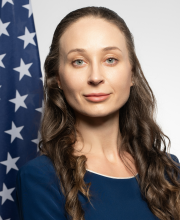Kathryn E. Monsey, LCSW, LCDC

Kathryn E. Monsey, LCSW, LCDC
Kathryn E Monsey, LCSW, LCDC is a Military Behavioral Health Social Worker for the Center for Deployment Psychology (CDP) at the Uniformed Services University of the Health Sciences in Bethesda, Maryland. She assists in the implementation and expansion of the Star Behavioral Health Providers Program (SBHP). SBHP trains civilian behavioral health providers to work with service members, veterans, and their families. The mission is to expand the availability of high-quality behavioral health services, especially for those in the National Guard and Reserve Component.
Kathryn holds over ten years of experience providing clinical services treating PTSD and substance use disorders within civilian, military and veteran populations. She has worked in inpatient, outpatient and residential treatment settings, including clinical research settings at the University of Indiana Bio Behavioral Alcohol Research Laboratory and University of Hawaii MRI/Neurology research program. Kathryn went on to work in the SATP program at the Veterans Administration in Washington State and subsequently as a Behavioral Health Provider for the Army. Kathryn worked as an embedded behavioral health provider at Ft. Hood, 1st Cavalry Division (Infantry) in 2018 as a Substance Use Disorder Clinical Care (SUDCC) provider and subsequently at USAG Wiesbaden (Germany) for 66th MI (Military Intelligence) and USAG Miami Health Clinic, providing co-occurring treatment for PTSD and substance use disorders.
Kathryn received her Bachelor of Arts in Psychological and Brain Sciences from Indiana University in 2011 and her Master of Social Work from University of Southern California, with a specialization on Military and Veteran Populations (MVP) in 2015. Kathryn further went on to specialize in PTSD and Substance Use disorders working in clinical and translational research through her bachelors and masters programs. She later received post graduate training in EMDR and trauma narrative therapies in addition to specialization licensure to treat substance use disorders. Kathryn has focused on addressing the unique needs of service members and veterans using evidence-based approaches, fitness for duty evaluations and harm reduction and abstinence based treatment models.
